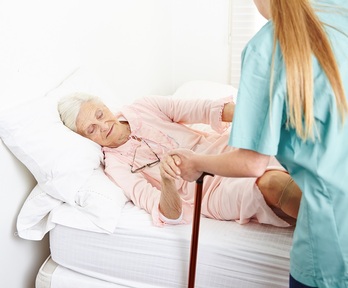Home care for older people could be better than going to hospital, study reveals
Hospital-style care at home for older people could be just as good or even better than treatment in hospital, researchers have discovered.

Instead of hospital admission, ‘Hospital at Home’ care involves hospital-level care provided to patients in their homes. Patients can get access to a geriatrician and multi-disciplinary team, medicines, oxygen and intravenous treatment. They can also be transferred to hospital, if required.
A study, led by researchers from the Nuffield Department of Population Health at Oxford University, involved 1,000 people with an average age of 83 years-old who had been referred for hospital admission.
The participants were randomly selected to receive Hospital at Home care or go to hospital but after six months, researchers found little difference between the two groups when it came to the death rate.
Some 16.9 per cent of people in the Hospital at Home group died, compared with the slightly higher figure of 17.7 per cent for people in the hospital group.
Participants at home less likely to develop delirium
After just one month, older people in the Hospital at Home group were slightly less likely to develop acute confusion (delirium), with only 1.7 per cent having it compared to 4.4 per cent of those in the hospital group.
Study lead Professor Sasha Shepperd said: "Our study has produced valuable information to guide policy and healthcare providers.
"Up until now, nobody has known whether to fully invest in Hospital at Home nationwide, or to focus on hospital care. Whether it is more expensive or not, if it means the same or better health outcomes and less disruption for certain patients then we should consider doing it."
Researchers also found no difference in cognitive impairment, impact on daily living or new chronic conditions between the two groups.
Professor Sheppherd said the study's finding show that caring for older people at home can improve patient outcomes while relieving pressure on hospitals.
For older people, hospital admission can cause acute confusion (delirium), reduce mobility and accelerate the transition to residential care.
Academics discovered people in the Hospital at Home group were slightly less likely to be in long-term residential care (5.7 per cent) than the group who went to hospital (8.7 per cent).
Researchers say this reveals a hospital-level care in the home is just as beneficial for older people as hospital care and home care can improve patient outcomes, while reducing pressures on hospitals.
Hospital at Home models are already operating in a few areas of the UK, and surveys have found that most older people prefer to receive care at home.
Higher levels of patient satisfaction for those at home
Participants were recruited for the study between March 2015 and June 2018.
Academics found there was little difference in the proportion of participants living at home, with 78.6 per cent in the Hospital at Home group were living at home, compared with 75.3 per cent in the hospitalised group.
Study participants were referred for hospital admission for many different reasons such as an infection (but not for more severe health issues, such as a heart attack).
The study, which was funded by the National Institute of Health Research (NIHR), also reported higher levels of patient satisfaction with Hospital at Home care.
Hospital at Home scored more highly regarding the length of time waiting for care to start, contacting staff, being involved in decisions and discussing further health or social care services.
The research team is now conducting an economic analysis of whether or not Hospital at Home care is cheaper than hospital-based care.
The study’s findings are published in Annals of Internal Medicine.
Latest News
 29-Jul-24
Dementia Bus gives carehome.co.uk staff insight into life with dementia
29-Jul-24
Dementia Bus gives carehome.co.uk staff insight into life with dementia
 27-Jul-23
UK's top home care agencies in 2023 revealed
27-Jul-23
UK's top home care agencies in 2023 revealed
 30-Nov-22
A quarter of older people keep their falls secret from family
30-Nov-22
A quarter of older people keep their falls secret from family
 29-Nov-22
'Covid-19 has not gone away' say terminally ill
29-Nov-22
'Covid-19 has not gone away' say terminally ill
 28-Nov-22
IT consultant who received poor care opens 'compassionate' home care business
28-Nov-22
IT consultant who received poor care opens 'compassionate' home care business